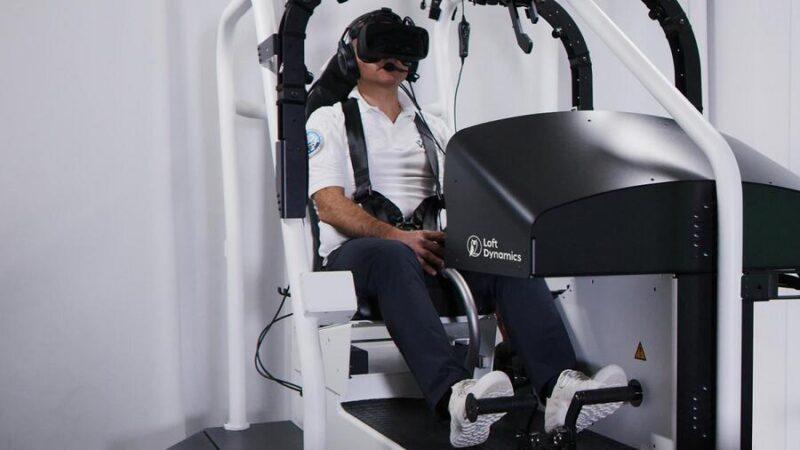The Swiss start-up Loft Dynamics has reinvented the simulator for helicopter pilots. With fresh money, the company now wants to conquer the USA.
In 2016, a company was born out of a gimmick and trial and error, VRM Switzerland - or Loft Dynamics, as it has been called since last Monday. We have also already written about VRM reports. Founder Fabian Riesen has developed a completely new type of flight simulator for helicopter pilots. Instead of sitting in a huge sphere with two-dimensional displays, they now sit in an open cockpit with virtual reality in front of their eyes. An idea that has now brought the company its first round of financing.
Loft Dynamics has won over the US technology investor Craft Ventures. The venture capitalist is putting 20 million dollars into the Swiss company. "This gives us the chance to distribute our simulator worldwide. This comes at exactly the right time, because the demand for safe and affordable training is huge," says Riesen happily. The CEO has his eye on the US market in particular.
A simulator that is ten times smaller and twenty times cheaper
Because the concept can save the industry costs and, above all, risks. A fully licensed flight simulator for helicopters costs around 20 million euros. "Many operators cannot afford regular training in a conventional simulator," Riesen explains. So, he says, practice takes place on actual flights, and many check-ups also take place under real conditions. "Every third accident happens here," says the founder.
Accordingly, the innovation was well received by pilots. But that did not mean that the air traffic control authorities would also like the idea. Riesen recalls his surprise when he received a call from EASA in 2018. Employees of the European Aviation Safety Agency had seen a video of the simulator on YouTube. They wanted to have a look at it on site.
Aviation authority became aware of the start-up through Youtube
EASA then sent a delegation to Switzerland. In April last year, the simulator for the Robinson R22 training helicopter was officially qualified by the authority. Pilots can now complete training just like in a real helicopter. This was followed in May 2022 by the qualification of the Airbus H125, a widely used model.
Now the next big step is coming up for the young company, and for this it needs outside capital for the first time. "So far, we've been able to finance ourselves with funds from our own pockets and from supporters," Riesen explains, "we also sold our first simulators quite early on."
Loft Dynamics distributes simulator plus service. The company sets up the device, keeps the software and hardware up to date. "And we train the training pilots and the pilots on the simulator, so they can use the simulator any time from then on," says the founder.
The team of the Swiss start-up seems to have discovered a gap in the market. "The possibility of being able to train pilots regularly at affordable conditions is highly relevant for the industry," says Oliver Freiland, the CEO of Heli Service International in Emden. Among other things, the company flies its helicopters to wind farms on the high seas.
More safety because pilots volunteer for more training
Until now, he says, training in the helicopter simulator has been very costly: "Not only are they expensive, there aren't that many either." Every change made to a helicopter by the manufacturer would have to be painstakingly entered into the simulator. The new data would either have to be acquired from the manufacturer, if he shares it at all. Or it would have to be flown in a time-consuming way. "The appropriate environmental data must also be incorporated, in our case wind farms, for example," says Freiland.
According to its own figures, Heli Service spends about 1.4 to 1.6 million euros a year on training. "We can afford that, but many small operators certainly can't." There, the pilots did not go to simulators. "If it were possible to build a simulator where all this is much easier and cheaper, that would be a real advantage for many operators and also a gain for safety."
Riesen: "The first experiences show that the pilots voluntarily do more training in the simulator. The market is big, he says, and it's not just about all the helicopters in the world. "It's also about the electric vertical take-off aircraft and fixed-wing aircraft. A simulator for an Airbus A350, for example, is not currently on the agenda, but we are discussing it.
Source: handelsblatt









